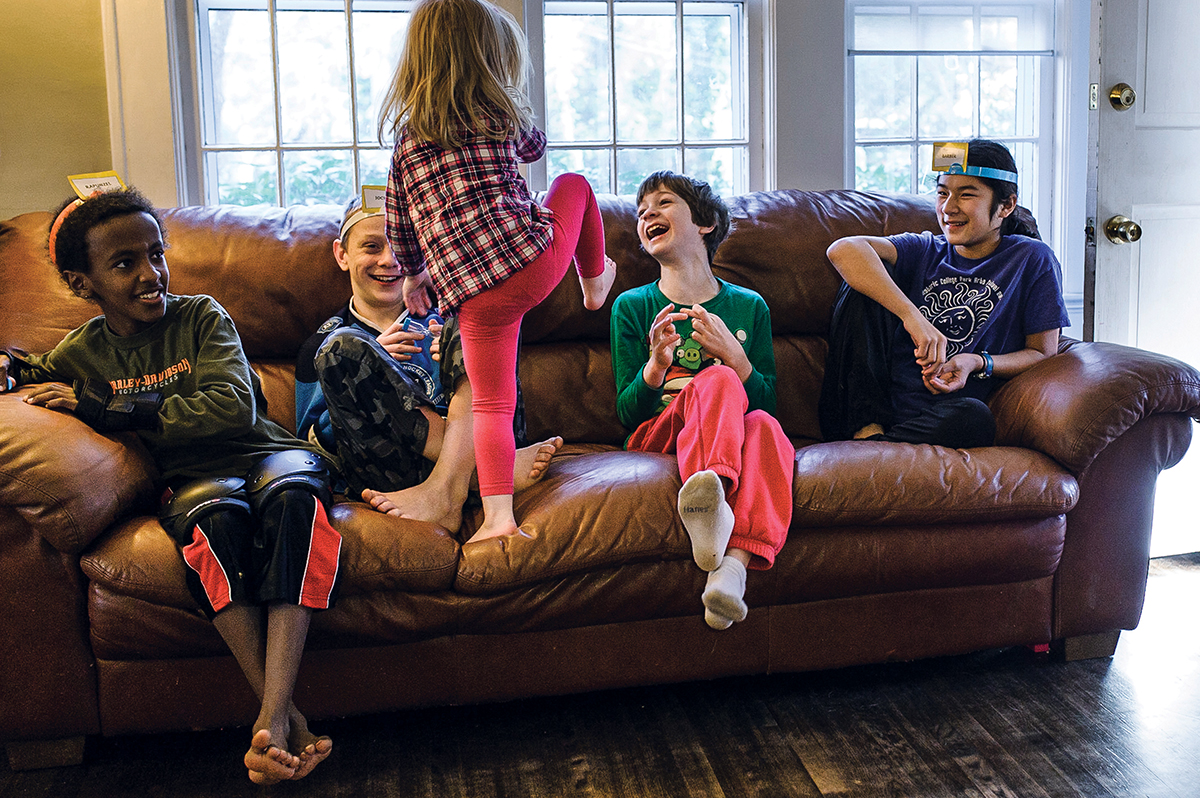Araminta Montague was moments away from meeting her seventh child. It was fall 2016. She and four of her children waited in their hotel room in Nanchang, China, for the director of the local orphanage to arrive with a five-year-old girl named Mei Ting, who had lived at the orphanage since birth. The rest of the family, father Jason and the two youngest children, waited at home in Atlanta.
Mei Ting walked into the hotel room holding the family photo album the Montagues had sent earlier. She opened the book and matched each of the children to their photos. She flipped to the photo of Araminta and pointed to it. “Mama,” she said. She found Jason’s picture, too. “Baba.”
You may unsubscribe from any of our newsletters at any time.
Araminta had cautioned her older children against rushing to hug Mei Ting, but once the little girl had made eye contact with everyone in the room, she put the photo album down, and the children started playing with balloons they’d brought from home. The orphanage director left.
For Mei Ting, there was no looking back. She was with her family.
Thanks to my younger sister, I am now the aunt of seven energetic, creative and unique children who range in age from three to 12. Araminta gave birth to three of them; the other four are adopted. Four of the kids have special needs. Although my sister and brother-in-law did not set out to make a statement, religious or political, with the way they’ve created their family, they are challenging what friends and family think they know about acceptance, compassion and belonging. Through their example, my sister and her children are making people aware of diversity and disability, and revealing the true meaning of family and love.
We grew up in southern Ontario as part of a family of four; our father was a funeral director, and our mother was a homemaker who was very involved with the local United church. Araminta earned a degree in music at McMaster University in Hamilton and moved to the United States to study music therapy. After completing a program at Georgia College, she began working as a music therapist at a Montessori school in Atlanta that rented space from a Lutheran church. Intrigued by all the programs listed in the church bulletin, she attended worship one Sunday and was introduced to Jason Montague, the choir director. He asked her to play piano for the church’s Easter cantata. Three months later, they eloped.
This June, Jason, 46, and Araminta, 44, will celebrate 20 years of marriage with their seven children: Mimi and George, who each turn 13 in a few months; Natan, 11; Vincent, 9; Lovie, 7; Mei Ting, now 6; and Violet, 3. Mimi and Mei Ting are from China while Natan and Lovie are from Ethiopia.
Jason, a music teacher at a private primary school, and Araminta, who later taught Grade 3 at the same school, waited seven years before starting their family because Araminta wanted to complete a master’s degree in education and teach for a few years before having children. “We always said we would adopt as well as have biological children,” she says.
Inevitably, people ask why. “I don’t really have an answer,” Araminta admits over the phone from her full house in College Park, a suburb of Metro Atlanta. “Shortly after Jason and I met, we were introduced to a family who had biological children as well as several internationally adopted special-needs children. That’s when I realized what our family could look like. There is a need, and I think it’s what responsible human beings do. Every child deserves a forever family.”
Jason gives most of the credit to his wife, calling Araminta “the driving force” behind the family. “I’m happy to be here, but she’s the energy,” he says. “She does this out of a desire to try to make things better.”
They were in the process of adopting their first child when they found out Araminta was pregnant in 2004. “There was never any question about stopping the adoption,” she says. “There was a daughter waiting for us in China.”

But first, they had a health crisis to deal with. George was born with a congenital heart defect, a condition that meant the major arteries going in and out of his heart were not growing. He underwent open-heart surgery at three months.
Mimi joined the family nine months after George’s birth, one month before her first birthday. “When Mimi came home, a friend told me she’d come in time to hold George’s hand as he worked his way through post-surgery, procedures and an unknown future,” says Araminta.
Indeed, the two oldest children formed a close bond immediately, even sharing a crib because that’s what Mimi was accustomed to at the orphanage in China. Araminta and Jason refer to their two children, blond and blue-eyed George and dark-eyed, black-haired Mimi, as “the twins.” (Mimi’s legal name is Ellen Mei. When toddler George began saying “Mee Mee,” it eventually became the name she answers to.)
Wanting more children, Jason and Araminta enrolled in the state of Georgia’s foster-to-adopt program and completed the required 20 hours of training. But they found the social worker they met with rude and judgmental, and were told they would have to wait five years before their adoption would be completed. Instead, they decided to do another international adoption.
Ten months later, in May 2007, Araminta and a friend travelled to an orphanage in Ethiopia and brought home 15-month-old Natan. He was a shy but happy boy with a beautiful smile. According to Araminta, it took him just three days to “make the click” to call her Mama, a sign that he trusted her; it had taken Mimi six months to reach that milestone.
Three-year-old George took a little longer to comprehend what adoption meant. One day, George asked his mother when Natan was going back home. It wasn’t asked out of hostility but curiosity.
“He’s not going back,” Araminta told him. “He’s your brother.”
“Natan’s my brother?” asked George in amazement.
By the time he was two, Natan began to show signs of what would later be diagnosed as developmental delays, believed to be a result of early malnourishment.
The following May, Vincent was born, and a year later, Jason and Araminta submitted an application to adopt from Ethiopia again, specifically requesting an infant with HIV. After dealing with George’s heart condition and Natan, whose inexplicable screaming fits were the hallmark of his toddler years, Jason and Araminta realized they could handle a special-needs child.
Whenever they got close to a referral, however, the baby tested negative. Their caseworker told them about another waiting child, who was blind. “I didn’t think I could handle a child that couldn’t see,” Araminta says, “but after a year, I asked our caseworker about her. I found out she’d already been considered by two families.” Those rejections lit a fire under Araminta, and she looked more closely at the child’s file. “She was blind, and there was some minor brain issue, but other than that, she was healthy and interactive. We talked to the kids and one of them said, ‘So if this girl is waiting and we’re waiting, why don’t we just adopt her?’”
In the spring of 2012, the family of two parents and four children travelled to Ethiopia to pick up two-year-old Tahitina, whom the family continues to call by her pre-adoption nickname, Lovie. Anticipating an “orphanage delay” in her physical growth, they had brought clothes for a one-year-old child. But Lovie was as small as an infant.
The family’s longtime pediatrician referred the toddler to a number of specialists. An ophthalmologist confirmed Lovie’s blindness, while an audiologist said Lovie’s ears were fine but suggested that “nothing was connected to the brain.” The first neurologist they saw asked why they would adopt a child like Lovie. Araminta answered, “Because someone needs to.” She walked out and made an appointment with their current neurologist.
After a series of scans, Lovie was diagnosed with polymicrogyria, a condition characterized by abnormal development of the brain before birth. Normally, the surface of the brain has a lot of folds; with polymicrogyria, the brain develops too many, and the folds are much smaller.
Lovie doesn’t see; she doesn’t speak, but she vocalizes; she can hear but cannot process sounds. She hits her head and face through uncontrollable arm movements. She receives nourishment through a feeding tube and experiences numerous seizures a day, some severe enough to exhaust her into a long sleep. She’s been considered palliative for a number of years.
Yet she is aptly named. Araminta says Lovie is teaching everyone around her the importance of compassion and that every life matters. “When we’re out and people are pointing and staring at Lovie, I know my kids are staring back and challenging people to say something. They will never make fun of another human being.”
Araminta remembers sitting in the wheelchair section to accommodate Lovie’s special stroller at a baseball game, when George got into a conversation with a young man with cerebral palsy whose speech was slurred. “I heard the man say he was hard to understand,” Araminta says. “George told him it was okay; he was too sometimes.”
Two difficult pregnancies followed. The first ended in miscarriage, the second with an emergency C-section. As her due date approached in February 2014, baby Violet was headfirst on the umbilical cord — at risk of suffocating if she arrived quickly. “It was pretty stressful,” Araminta says. “After Violet was born, Jason said, ‘That’s it. We can adopt, but we’re not doing this again.’”
Araminta already had a child in mind. “I’d discovered the website of an organization that advocates for and assists families with the international adoption of children with special needs,” she says. Once Araminta found out how long Mei Ting had been in the orphanage, she kept coming back to her. “I’d check back every couple of months, and she’d be there. We had Violet, but still I would check and Mei Ting would be there.”
They had some extra money on the way from the sale of their former house, which they’d been renting out ever since a move in 2012. The plan was to use the cash to fix up their backyard. “But as soon as the house sold, I looked at Jason and he said, ‘Yes, we can adopt instead.’ He knew,” she says with a laugh. The money, along with fundraising and a grant from the advocacy organization, made it possible to give Mei Ting a family of her own.
Now every morning, the seven children gather around the dining room table for school. With so many children and varying degrees of abilities, not to mention George’s heart condition, sending them to public school was not an option, so Araminta is homeschooling. “The only thing they’re missing out on is band,” she says. “They do gymnastics and swimming, they play soccer and they want to learn tennis. They’re in community theatre and choir. We teach them piano. We have a membership at the zoo.”
The children’s busy schedules were one of the reasons for the move in 2012; now Jason’s work is a three-minute walk from home. The couple have no other family in Georgia to rely on, and they do not employ a nanny or even a babysitter. “Jason is 100 percent hands on,” Araminta says. “When he comes through the door, he picks up his kids.”

Jason relishes the noise and chaos of his home, adding that it’s good to be greeted by loud children running around. “I’m happy,” he says. “I want the noise.”
He says he wouldn’t be the person he is now without this family. He calls it humanizing. “My outlook on the world is a lot different now,” he says, with more awareness of people in need and less sympathy for those who complain despite getting three square meals a day. “They just don’t know what they have.”
The children learned a similar lesson on their trip to Ethiopia to adopt Lovie. Araminta incorporates their international travel into their education, with a goal of creating global thinkers. While there, the four eldest children saw Lucy (Australopithecus afarensis), one of the oldest skeletons of an early human, at the museum in Addis Ababa; ate the local food; and taught their house guard how to play Go Fish, even though he didn’t speak English. “We are a one-income family. The kids have never had as much as other kids because we’ve never had a lot of money, but they came home from that trip to Ethiopia more grateful and less greedy,” says Araminta.
She adds that last fall’s three-week trip to China to adopt Mei Ting was more education than she could have given them in two years. “The language was different, the food was different, even how you go to the bathroom was different,” she says. “I want them to know the world is out there for them, and there is no limit to what they can do.”
Four months after returning from the trip, Araminta sat in the cardiologist’s office waiting for the doctor to return after checking out a heart murmur in Mei Ting, who had accompanied her mother and oldest brother to his annual checkup. On this day, the news for George was good: his arteries showed improvement. Mei Ting, born with a cleft palate that needs repairing, had to have routine tests before her procedures began; when her EKG revealed a heart murmur, the doctor ordered an echocardiogram.
Araminta recalls the cardiologist’s words when he came back with the results: “She has a small hole in her heart, but it’s no big deal. This probably won’t faze you after what you’ve been through with George.”
“He’s right,” she says. “A hole in the heart is a walk in the park compared to George and Lovie.”
At the same time, Araminta knows they wouldn’t have adopted Mei Ting 14 years ago; they wouldn’t have been able to handle it. Her first language is Mandarin, and she can barely speak it, let alone any English words, because of her cleft palate. (The first of several corrective surgeries was in March.) At age six, she’s shorter than her three-year-old sister, Violet.
Yet, Mei Ting has blended into this big, noisy and very busy family with remarkable ease. She helps her mother in the kitchen and smiles as wide as she can whenever someone calls her name. And whenever music plays, Mei Ting dances. “She doesn’t seem to notice that she looks different or is too small,” Araminta says. “She’s confident in her happiness and who she is. She’s pure joy.”
This story first appeared in the May 2017 issue of The Observer with the title “Family without borders.”















